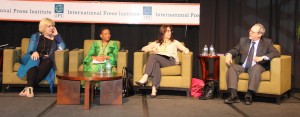 Today, the 17th annual Joint Declaration by the four specialised mandates tasked with promoting and protecting freedom of expression at the UN, OAS, OSCE and African Commission was launched in Paris, France. This latest Declaration, prepared with the assistance of the Centre for Law and Democracy and ARTICLE 19, highlights issues relating to the universality of the right to freedom of expression.
Today, the 17th annual Joint Declaration by the four specialised mandates tasked with promoting and protecting freedom of expression at the UN, OAS, OSCE and African Commission was launched in Paris, France. This latest Declaration, prepared with the assistance of the Centre for Law and Democracy and ARTICLE 19, highlights issues relating to the universality of the right to freedom of expression.
Click here to read the Joint Declaration in English
Click here to read the Joint Declaration in Arabic
Click here to read the Joint Declaration in French
Click here to read the Joint Declaration in Russian
Click here to read the Joint Declaration in Spanish
“The universality and inter-dependence of all human rights has long been recognised by international bodies, including the United Nations,” said Toby Mendel, Executive Director of CLD, who participated in the launch event. “But this is the first time that a statement has been adopted highlighting the specific attributes of universality in the context of the right to freedom of expression.”
The Joint Declaration focuses on two related aspects of universality in relation to freedom of expression, namely the right of all individuals and groups in society to enjoy this foundational right and the illegitimacy of imposing restrictions on freedom of expression which seek to impose the traditions, culture and value of dominant groups on others. To achieve these ends, the Joint Declaration recognises that certain laws, customs and practices may need to be modified or even eliminated.
Some of the other key points made in the Declaration include the following:
• States should put in place positive measures – including the promotion of public service broadcasting and community media – to ensure that all individuals and groups in society can enjoy the right to freedom of expression.
• States have little or no power to restrict certain types of speech, most importantly political speech.
• Laws which restrict speech to protect religions, which prevent minorities from speaking out about issues of concern to them or which provide special protection to officials and State symbols are illegitimate and should be repealed.
• The international community should do more to promote dialogue and debate about the universality of freedom of expression.
For further information, please contact:
Toby Mendel
Executive Director
Centre for Law and Democracy
email: toby@law-democracy.org
tel: +1 902 997-1296
www.law-democracy.org



